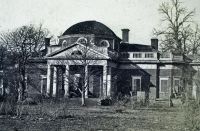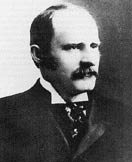Podcast: The Life of Uriah Phillips Levy
Former Monticello guide, Danna Kelley focuses on the memorable story of Uriah Phillips Levy and his connection to Monticello.


The history of Monticello does not end with Jefferson's death. Nearly a century passed from the time between Jefferson's death and 1923, the year that the Thomas Jefferson Foundation assumed the stewardship of the property. The story of the intervening years has been recorded with many variations, but of one fact there can be no disagreement: Monticello survives because of the efforts of its two major owners of the period, Uriah Phillips Levy, USN, and his nephew, Jefferson Monroe Levy. These two men and their families held a very modern notion that the houses of great men should be preserved as "monuments to their glory," and their stewardship of the home and property is remarkable and significant.
Uriah Levy's first view of Monticello -- eight years after Jefferson's death -- was dismaying. Upon learning that it was for sale, he decided to buy it and preserve it for the nation. What he acquired was 218 acres of overgrown fields surrounding a dilapidated, almost empty house, for the sum of $2,700. Levy promptly hired Joel Wheeler as overseer to supervise a restoration of both house and garden. Tourists began visiting the property in ever growing numbers and were often guided through the house by Uriah Levy himself. By 1837, he had enlarged his property to 2,700 acres.
Upon his death in 1862, Commodore Levy left a complicated will, naming the United States as administrator of the estate, to be used as a school for orphans of naval officers. Meanwhile, the Civil War began, and the Confederate government seized and then sold the property to another owner. Following the war, a long period of litigation was required before Commodore Levy's nephew, Jefferson Monroe Levy, became Monticello's sole proprietor.

Running time 1 minute
Nineteen years had passed since Uriah Levy's death, and during that time, the estate had been transformed into a working farm, with pigs rooting in the flower beds, cattle grazing on the West Lawn and being stabled inside the house, and grain stored in the house. Jefferson Levy ousted Wheeler as overseer and began a search for a more appropriate caretaker.
In 1889 he found the highly competent and dedicated Thomas L. Rhodes. The two of them effected a thorough rehabilitation and restoration, purchasing Jefferson's furniture wherever they could find it, and even adding 300 acres to the property.
Levy served as a Congressman at times during the early 1900s and was encouraged by associates in Washington to turn the property over to public ownership. Though initially reluctant, in 1914 he offered the federal government the opportunity of purchasing Monticello, but after much congressional rhetoric on the subject, no funds were forthcoming.

In the depression following World War I, Jefferson Levy found it necessary to put the property on the market. On April 13, 1923 (the 180th anniversary of Thomas Jefferson's birth), the Thomas Jefferson Foundation was formed in New York. The organization negotiated with Levy for the purchase of the property at a cost of $500,000, and has carried on to the present the tradition of preservation established by the Levy family.
The above text was condensed from an address, "The Levy Family and Monticello," written by the late Dr. Malcolm H. Stern, Genealogist at the American Jewish Archives, and delivered by Mr. Saul Viener at Monticello on June 7, 1985.

Former Monticello guide, Danna Kelley focuses on the memorable story of Uriah Phillips Levy and his connection to Monticello.

Virginia’s Jewish population was small, but anything but insignificant during Thomas Jefferson’s lifetime. In fact, the stories of Jewish people are tied to Monticello in many ways: through Jefferson’s letters, through business, and through the enslaved community.

In this live Q&A Marc Leepson, author of Saving Monticello, discusses Uriah Levy and how Levy’s admiration for Jefferson’s stance on religious freedom motivated his purchase and preservation of Monticello.

Monticello Guide Holly Haliniewski looks at the Levys, who owned and preserved Jefferson's mountaintop for nearly a century.

Filmmaker Steven Pressman, author Marc Leepson, and Monticello curator Susan Stein describe the battles that took place in Congress and across the nation to wrest Jefferson's home from its Levy stewards and open it as a national shrine.

On July 4, 2017, Rabbi David N. Saperstein, former U.S. ambassador-at-large for international religious freedom, welcomed 70 of America's newest citizens at the 55th Annual Independence Day Celebration and Naturalization Ceremony on Monticello's West Lawn before a crowd over 2,000 people.

ADDRESS:
931 Thomas Jefferson Parkway
Charlottesville, VA 22902
GENERAL INFORMATION:
(434) 984-9800